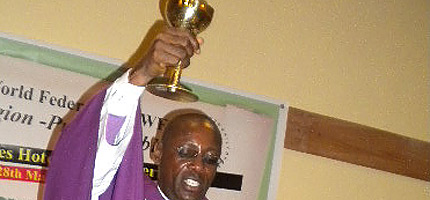© LWF/S. Djobdi
29.03.2010
Emphasis on Theological Formation That Is Relevant to African Mission Priorities
The Petition for Daily Bread in an African Context
ABUJA, Nigeria/GENEVA, 29 March 2010 (LWI) - Zimbabwean church leader Bishop em. Dr Ambrose Moyo has reminded African Lutheran churches of the urgent need to adapt their theological education and ministry formation to the continent’s needs.
Moyo elaborated the churches’ crucial role for the continent’s Christian leadership when he addressed church leaders and other representatives of The Lutheran World Federation (LWF) member churches attending the 24-28 March Africa Pre-Assembly and Church Leadership Consultation in Abuja, Nigeria.
He pointed out that while the number of members in African Lutheran churches showed a steady growth over the years—with 18.7 million in 2009—there was “a crisis of leadership in most of our churches with most of our seminaries almost closing down.”
“This [membership] growth places significant challenge on the churches in the South to develop capacities and credible leadership” to respond to the relevant issues in church and society. “It is critical that we come up with structures and programs that will build the capacity of the global South to assume leadership roles in all aspects of God’s mission,” said Moyo, who led the Evangelical Lutheran Church in Zimbabwe (ELCZ) from 1996 to 2001.
In his presentation, the former ELCZ bishop provided an interpretation of the LWF Eleventh Assembly theme “Give Us Today Our Daily Bread” for African Lutheran churches in view of the continent’s enormous mineral and other resources; the dependency syndrome and its effects on the region; public policy implications for food production; theological education and leadership development; diakonia and the reception of ecumenical agreements by the continent’s churches.
He challenged churches to reflect from an African perspective on Martin Luther’s explanation of the petition for daily bread in the Small Catechism. Would Luther have elaborated daily bread the way he did “if he was an African [dealing with] hunger and starvation, bad governance, the many wars and the cry for peace, justice, reconciliation and healing?” posed Moyo. He stressed the need to write “our own African catechism which will be simple and relevant, dealing with bread and butter issues in Africa today.”
Similarly, liturgies in some of the Lutheran churches in Africa had not changed since they were produced by the early missionaries, with symbols that no longer relate to the African experience today, remarked Moyo.
He said it was, however, encouraging to note that some of the LWF member churches or regional bodies had produced their own Sunday school and confirmation materials, which should be shared so that all can benefit or enrich each another.
Options
Moyo pointed out that the quality of theological education and ministerial training and formation in most African Lutheran churches “leaves much to be desired.” However, turning to academic universities to bridge this deficiency “has been disastrous in some cases,” as such institutions could not augment academic religious studies with programs that are clearly formulated for the church’s mission.
Solutions could be found in the sharing or pooling of existing resources or by learning from the experience of institutions such as the Makumira University College of the Evangelical Lutheran Church in Tanzania.
Ecumenical Agreements’ Reception
Moyo reminded churches of their responsibility in involving congregations in the reception of ecumenical agreements between the LWF and other Christian World Communions. He explained the significance of the anticipated LWF Eleventh Assembly action of reconciliation with churches of the Anabaptist family, and the October 1999 signing of the Joint Declaration on the Doctrine of Justification with the Roman Catholic Church. He called on churches to facilitate the ownership of such agreements, rather than treating them as “property of the top church leadership.”
Prophetic Diakonia
Moyo cautioned the continent’s Lutheran churches against being passive recipients of development initiatives, urging them to become actively engaged in the decision-making processes concerning the region’s diaconal activities.
Reminding churches of their responsibility as caretakers of God’s creation, the former ELCZ bishop called for the churches’ prophetic role in seeking solutions to environmental degradation and the causes of climatic changes, and on issues of good governance, economic justice and politics. Lutheran churches on the continent should “revisit our doctrine of the two regiments of God to understand its implications for our search for food for all,” he added. (716 words)
Journey | Africa Pre-Assembly Consultation

